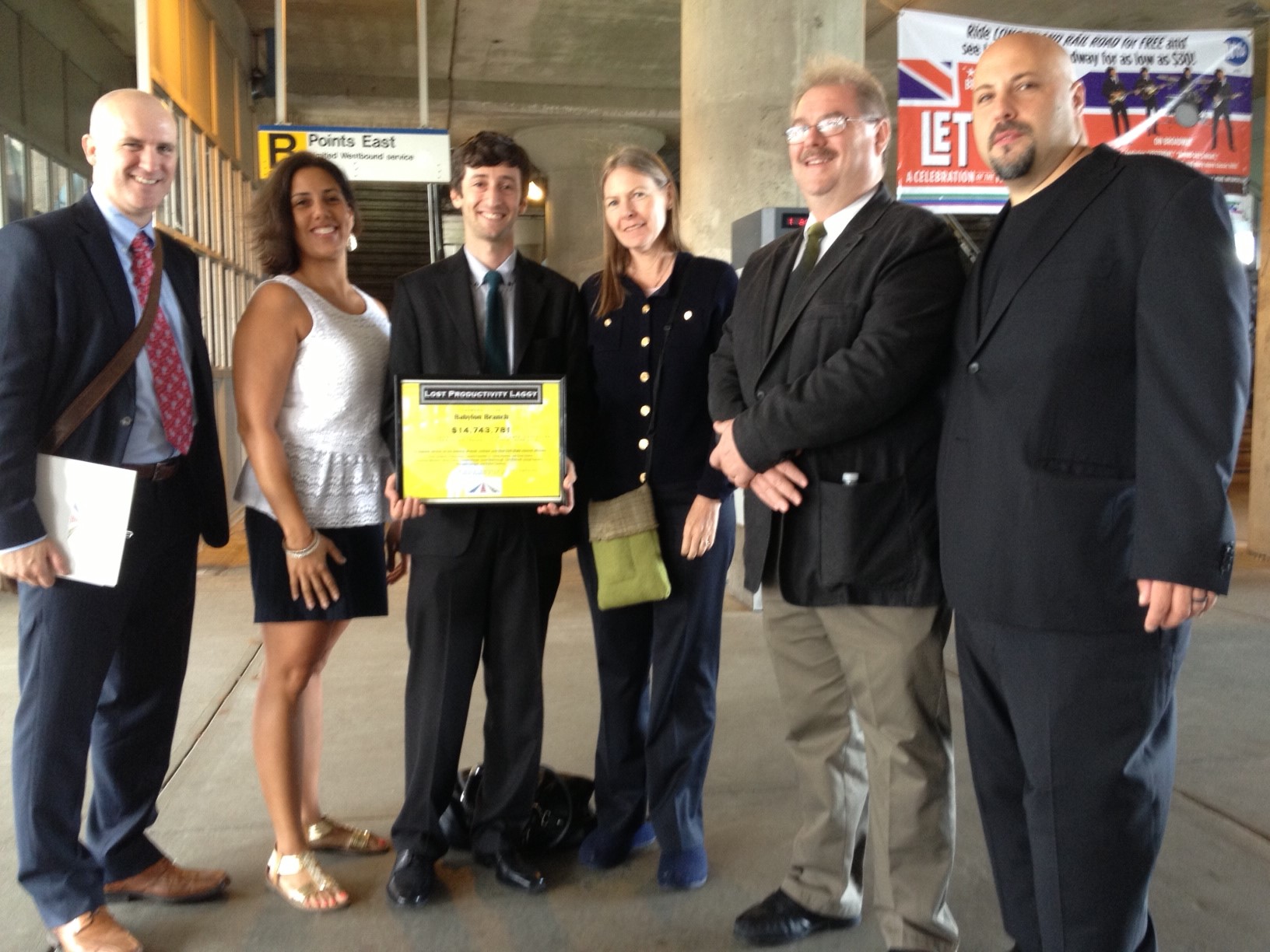
Today, Tri-State Transportation Campaign presented its inaugural Laggy Awards given to those branches of the Long Island Rail Road (LIRR) with the greatest lost economic productivity, delay per rider, and lost time.
The awards are intended as a signal to state legislators whose districts are home to the LIRR’s least-reliable branches that additional capital investment is needed to ensure that the system continues to serve as an asset — and not an impediment — to Long Island’s economic success. The next capital program of the Metropolitan Transportation Authority, of which LIRR is a subsidiary agency, will cover 2015-2019 and planning for the program will begin this fall.
TSTC estimates the total lost productivity due to late, cancelled and terminated trains between July 2012 to June 2013 at $60,760,661. The Babylon, Ronkonkoma and Huntington branches led the way, winning the gold, silver and bronze Lost Productivity Laggies, respectively.
| Lost Productivity Laggy | Branch |
Total Economic Cost ($) |
| 1. Gold | Babylon |
$14,743,781 |
| 2. Silver | Ronkonkoma |
12,285,067 |
| 3. Bronze | Huntington |
9,805,101 |
“LIRR’s frequent delays truly add up to lost economic productivity and commuter time over the course of a year,” said Ben Rosenblatt, the research fellow for the Tri-State Transportation Campaign who conducted the analysis. “In fact, estimates of total lost productivity are greater than last year’s profits of some of Long Island’s largest companies, such as VOXX International, Nathan’s, and 1-800 FLOWERS.”
Tri-State also awarded Laggy Awards for total hours of delay and average delay per rider; a fact sheet with all Laggy recipients in the three categories is available here.
The Laggy Award methodology was developed using MTA-provided ridership, on-time performance, and other lateness, termination, and cancellation data, along with Census-derived income assumptions regarding the value of lost time.
Each Laggy identifies elected officials that serve the areas hardest hit by delays. It is the responsibility of these lawmakers to identify, and fully fund, the Metropolitan Transportation Authority’s 2015-2019 Capital Program to ensure the LIRR system is reliable and in a state of good repair. These projects include:
- Further fast-tracking of LIRR’s Second Track project;
- Reboot of LIRR’s Third Track project;
- Funding for signal improvements, such as the Babylon Interlocking;
- Wi-fi capabilities on LIRR trains and at stations, in order to mitigate the productivity losses associated with delays.
A press release announcing the inaugural Laggy Awards can be found here.

If these figures are based on what the LIRR publishes – then they are way too low. The LIRR Commuters Campaign Estimates that real LIRR On Time Performance is close to 75% – not 95%.
This would increase the economic loss to about $300,000 per month for the three branches in the story.
In addition the real cost is even worse – as LIRR numbers treat a 6 minute delay exactly the same as a 2 hour delay.
It is not quantifiable, but a category measuring passenger pain/frustration would be great.
[…] Tri-State Unveils LIRR “Laggy” Awards for Delayed Service (MTR) […]
thank the NIMBY’s in Nassau who oppose building extra tracks. nice that LIRR is finally going to build the extra tracks for the ronkonkoma line
From what I’ve heard the Babylon Branch is actually the best of the 3 main ones (Huntington/Port Jefferson, Ronkonkoma, Babylon)
Tired of the LIRR increasing rates, delays, cancellations, excuses? Help make a difference for you and millions of riders like you by helping to create the LIRR Oversight and Accountability Act in three easy, 30 second steps.
1) Go to: http://www.change.org/petitions/help-create-the-lirr-oversight-and-accountability-act
2) Sign the petition
3) Share with friends via email and Facebook and ‘like’ our page at: https://www.facebook.com/LIRRoversightandaccountability
[…] New York State Senator Charles Fuschillo, who represents commuters who live along the much-maligned Babylon Branch, has been nominated by Senator Charles Schumer to join Amtrak’s board of […]